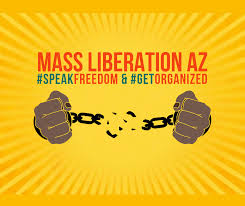Judges in this state should know better than almost anyone what a crime it is to have these mandatory minimum sentencing guidelines - Arizona's are some of the worst, as are the plea bargains. People are punished brutally by prosecutorial excess and sentencing guidelines for taking things to trial that they may get probation on if they pled guilty - those tend to be the people who won't compromise because they adhere to their innocence - and they get the worst sentences when found guilty.
The judiciary, therefore, should really be leading this charge - why are they so silent, then, instead of lining up to give testimony to the legislature? They only compound their complicity in something they know is wrong the longer they fail to speak out. Meanwhile, peoples' lives are laid to waste.
Andrew Thomas - the Maricopa County attorney who was disbarred a couple years ago for abuse of power, among other things - boasts over 200,000 felony convictions during his reign alone - many of which were plea bargains, and some of which were witch hunts of innocent people, like Lisa Randall. But Thomas was really only punished when he went after the rich and poweerful, not the ordinary people. The politicans he persecuted got huge settlements for defamation, while the ordinary citizens who got caught in his prosectuion machine - like Courtney Bisbee - remain imprisoned and fighting for justice.
Here is the Arizona Supreme Court: ask them why they haven't assumed leadership in advocating for an end to mandatory minimums in Arizona. Seriously - maybe if they get enough letters they will realize that promoting sound, evidence-based sentencing policies is responsible judicial leadership, while rubber-stamping injustice is a betrayal of what they are supposed to be all about. Contact them through the court clerk on the fourth floor of the Arizona State Courts Building.
By Phone: 602 - 452 - 3396
By Email: scclerk@courts.az.gov
Arizona Supreme Court
1501 W. Washington, Suite 402,
Phoenix, AZ 85007-3232
And here are the judges of the Maricopa County Superior Court - hold them accountable too.
Maricopa County Superior Court
125 W. Washington
Phoenix, AZ 85003
(602) 506-3204
Tell them all that the "truth in sentencing" is that way too many decent, salvageable human beings are languishing and dying in Arizona's prisons under sentencing guidelines designed to profit political careers and privateers, not promote public safety or justice. Tell our judiciary to show some courage and take the legislature to task over it this coming session. Evidence-based sentencing is where it's at thee days -we need legislation that works for the people, not just for the politicians. We're building and filling new prisons, when we should be emptying them.
It's time for a change, Arizona. Let's not lag behind the rest of the country on this one - c'mon and step out in front, Arizona's Honorables, and do the right thing. You are reponsible for our bulging prisons, too...
"Truth in Sentencing: Incarceration is Violence."
Maricopa County C0urt Complex, Phoenix (11/01/13)
---------------------
An Offer You Can't Refuse: Mandatory Minimums in America
(FULL REPORT link)
Summary
Darlene Eckles let her drug-dealing brother operate from her house for six months and helped count his money. Federal prosecutors offered to let her plea to a 10-year sentence; she rejected the offer and is now serving an almost 20-year sentence.
Federal prosecutors offered to let Patricio Paladin plead in return for a 20-year sentence for cocaine distribution. He refused to plead and is now serving a sentence of life without parole.
Weldon Angelos was offered a plea of 15 years for marijuana distribution and gun possession. He refused the plea and is now serving a 55-year sentence.
Eckles, Paladin, and Angelos were convicted of federal drug and gun offenses after rejecting plea offers and opting instead to go to trial. Prosecutors sought their remarkably long sentences—at least double the time they would have served had they agreed to plead—not only for their crimes, but for refusing to plead guilty on the prosecutors’ terms.
***
The right to trial lies at the heart of America’s criminal justice system. Yet trials have become all too rare in the United States because nine out of ten federal and state criminal defendants now end their cases by pleading guilty.
There is nothing inherently wrong with resolving cases through guilty pleas—it reduces the many burdens of trial preparation and the trial itself on prosecutors, defendants, judges, and witnesses. But in the US plea bargaining system, many federal prosecutors strong-arm defendants by offering them shorter prison terms if they plead guilty, and threatening them if they go to trial with sentences that, in the words of Judge John Gleeson of the Southern District of New York, can be “so excessively severe, they take your breath away.”[1] Such coercive plea bargaining tactics abound in state and federal criminal cases, including federal drug cases, the focus of this report.
Plea bargaining means higher sentences for defendants who go to trial. In 2012, the average sentence of federal drug offenders convicted after trial was three times higher (16 years) than that received after a guilty plea (5 years and 4 months).
The threat of higher sentences puts “enormous pressure [on defendants] to plead,” Mary Pat Brown, a former federal prosecutor and senior official in the Justice Department told us.[2] So much so that plea agreements, once a choice to consider, have for all intents and purposes become an offer drug defendants cannot afford to refuse. Only three percent of federal drug defendants go to trial. Human Rights Watch believes this historically low rate of trials reflects an unbalanced and unhealthy criminal justice system.
In this report, Human Rights Watch presents cases that illustrate the unjust sentences that result from a dangerous combination of unfettered prosecutorial power and egregiously severe sentencing laws. We also present new data developed for the report that documents the extent of the “trial penalty”— the higher sentences that defendants who go to trial incur compared to what they would receive if they plead guilty. In essence, it is the price prosecutors make defendants pay for exercising their right to trial.
US constitutional jurisprudence offers scant protection from prosecutors who are willing to pressure defendants into pleading and punish those who insist on going to trial. Courts do not view defendants as unconstitutionally coerced to forego their right to a trial if they plead guilty to avoid a staggering sentence. Nor do they consider defendants to have been vindictively—that is, unconstitutionally—punished for exercising their right to trial when prosecutors make good on their threats to seek much higher mandatory penalties for them because they refused to plead. Finally, even when courts agree that prosecutors have sought egregiously long mandatory sentences for drug offenses, they will not rule the sentences so disproportionate as to be unconstitutionally cruel.
Prosecutorial Power and Mandatory Sentences
Prosecutors have discretion, largely unreviewable by judges, as to what charges to bring, what promises or threats to make in plea bargaining, and whether to carry out those threats if the defendant does not plead.
While all prosecutors are in a powerful position vis-a-vis criminal defendants, the power of federal prosecutors in drug cases is strengthened by mandatory sentencing laws that curtail the judiciary’s historic function of ensuring the punishment fits the crime. When prosecutors choose to pursue charges carrying mandatory penalties and the defendant is convicted, judges must impose the sentences. Prosecutors, in effect, sentence convicted defendants by the charges they bring.
Prosecutors typically charge drug defendants with offenses carrying mandatory minimum sentences. Mandatory minimum drug sentences are keyed to the weight of the drugs involved in the offense (and the weight of filler substances, like cornstarch, used to dilute the drug). For example, the mandatory minimum sentence for dealing 5 kilograms of cocaine is 10 years and the maximum is life, regardless of the defendant’s role or culpability. The sentence imposed upon conviction will usually be higher than the minimum, as judges—taking their cue from the federal sentencing guidelines—take into account the actual amount of drugs involved in the crime, the defendant’s criminal history, and other aggravating and mitigating factors.
In fiscal year 2012, 60 percent of convicted federal drug defendants were convicted of offenses carrying mandatory minimum sentences.[3] They often faced sentences that many observers would consider disproportionate to their crime. An addict who sells drugs to support his habit can get a 10-year sentence. Someone hired to drive a box of drugs across town looks at the same minimum sentence as a major trafficker caught with the box. A defendant involved in a multi-member drug conspiracy can face a sentence based on the amount of drugs handled by all the co-conspirators, even if the defendant had only a minor role and personally distributed only a small amount of drugs or none at all.
Drug defendants have only three ways to avoid mandatory sentences: they can go to trial and hope for an acquittal, even though nine out of ten defendants who take their chances at trial are convicted; they may (if they are a low-level, nonviolent drug offender with scant criminal history) qualify for the limited statutory safety valve that permits judges to sentence them below the applicable mandatory sentences if they are convicted—although most defendants do not qualify; and they can plead guilty.
Most prosecutors will offer drug defendants some sort of plea agreement that reduces their sentence, sometimes substantially. Indeed, they file charges carrying high sentences fully expecting defendants to plead guilty. To secure the plea, prosecutors may then offer to lessen the charges, they may offer to reduce the ones that do not carry mandatory sentences, to stipulate to sentencing factors that lower the sentencing range under the sentencing guidelines or, at the very least, to support a reduced sentence based on the defendant’s willingness to accept responsibility for the offense, i.e., to plead guilty. Prosecutors may also agree to file a motion with the court to permit the judge to sentence below the mandatory sentences when the defendant has provided substantial assistance to the government’s efforts to prosecute others.
But prosecutors also threaten to increase defendants’ sentences if they refuse to plead. Perhaps their most powerful threats are based on two statutory sentencing provisions that can dramatically increase a drug defendant’s sentence. Under 21 U.S.C. §841(b)(1) prior felony drug convictions can dramatically increase a mandatory minimum drug sentence. Under 18 U.S.C. §924(c) prosecutors can file charges that dramatically increase a defendant’s sentence if a gun was involved in the drug offense. Prosecutors will threaten to pursue these additional penalties unless the defendant pleads guilty – and they make good on those threats.
Prior Convictions
Sentencing enhancements based on prior drug convictions are triggered only if prosecutors choose to file a prior felony information with the court. If a prosecutor decides to notify the court of one prior conviction, the defendant’s sentence will be doubled. If the prosecutor decides to notify the court of two prior convictions for a defendant facing a 10-year mandatory minimum sentence on the current offense, the sentence increases to life—and there is no parole in the federal system.
Many defendants plead when faced with the threat of such sentences. Early in 2013, for example, Lulzim Kupa refused to plead even though he was looking at a mandatory minimum of 10 years for distributing cocaine. A few weeks before the scheduled trial date, the government filed a prior felony information providing notice of two prior marijuana convictions. It then offered to withdraw the notice (as well as the original 10-year mandatory minimum) if Kupa would plead to a lower charge. He did, and avoided the prospect of life in prison—eventually receiving a sentence of 11 years.[4]
Involvement of Weapons
If a weapon was involved in a drug offense, prosecutors will press the defendant to plead by raising the specter of consecutive sentences under 18 U.S.C §924(c). The first §924(c) conviction imposes a mandatory five-year sentence consecutive to the sentence imposed for the underlying drug crime; second and subsequent convictions each carry 25-year consecutive sentences—resulting in grotesquely long sentences for drug defendants. In 2004 for example, Marnail Washington, a 22-year-old with no criminal history, was sentenced to 40 years after conviction of possession with intent to distribute crack cocaine and two §924(c) counts based on possessing, but not using, guns in connection with his drug offenses. That is, 30 years of his 40-year sentence were on gun counts.
It is entirely up to prosecutors whether to pursue these increased penalties against an eligible defendant. If they do and the defendant is convicted, the penalties are mandatory and judges must impose them. In one case in 2002, Judge Paul Cassell was so distressed at his powerlessness to avoid imposing an unduly harsh sentence on a young marijuana dealer (55 years for convictions on three §924(c) counts) that in his sentencing memorandum he called on President George W. Bush to commute the sentence. The president did not do so. And in a 2010 case, Judge Kiyo Masumoto said that she thought a 20-year sentence was “quite more than necessary” in the case of Tyquan Midyett, a low-level drug dealer who refused a 10-year plea and the prosecutors then doubled his sentence by filing a prior felony §851 information. Still, the judge said she did “not have discretion under the law to consider a lesser sentence.”[5]
Punishment to Fit the Crime?
Under well-established criminal justice principles, reflected in US and international human rights law, convicted criminal offenders should receive a punishment commensurate with their crime and culpability and no longer than necessary to serve the legitimate purposes of punishment. Those purposes include holding offenders accountable for their wrongdoing, protecting the public by keeping them in prison, deterring crime, and rehabilitating the offenders. They do not include penalizing defendants for going to trial or discouraging future defendants from doing so.
Prosecutors nonetheless believe a defendant’s insistence on going to trial is a perfectly legitimate reason to pursue an increased sentence—even one that is wholly disproportionate to the underlying offense. As a former US Attorney told us: “We weren’t trained to think about the lowest sentence that serves the goals of punishment.” [6]
Even prosecutors who try to achieve fair sentences through plea bargains acknowledge that the quest for fairness ends if the defendant refuses to plead. Prosecutors also insist they are not "punishing" defendants with higher sentences when they refuse to plead guilty, but rather “rewarding” defendants who, by pleading, spare them the expenditure of time and resources needed for a trial. From the perspective of the defendant looking at a significant trial penalty, this is no distinction.
Once they have made a threat during plea negotiations, prosecutors believe they must follow through with it if the defendant goes to trial, both because a defendant who refuses to plead deserves “no mercy,” and because they want to be sure future defendants take their threats seriously. They think they will lose credibility if they permit defendants to reap the same sentencing "concessions" after a trial as they had been offered if they pled. Asked if they thought these much higher post-trial sentences are just, prosecutors dodged the question.
In 2012, 26,560 federal drug defendants were prosecuted by 93 US Attorneys and over 5,400 assistant US attorneys in 94 federal districts.[7] Determining prosecutorial practices and policies in each district is beyond the scope of this report. Our research shows that prosecutorial charging and plea bargaining practices vary dramatically from district to district. It also shows that the trial penalty is widespread across the country.
Key Findings
Using sentencing data from individual cases collected nationwide by the United States Sentencing Commission (the Sentencing Commission), most of it from 2012, Human Rights Watch has developed statistics that shed light on the size of the trial penalty. Each case contains a unique mix of factors that results in the final sentence, but our findings nonetheless provide deeply troubling evidence of the price defendants pay if they refuse to plead.
Among our findings:
Defendants convicted of drug offenses with mandatory minimum sentences who went to trial received sentences on average 11 years longer than those who pled guilty (215 versus 82.5 months).
Among first-time drug defendants facing mandatory minimum sentences who had the same offense level and no weapon involved in their offense, those who went to trial had almost twice the sentence length of those who pled guilty (117.6 months versus 59.5 months).
Among defendants who were eligible for a sentencing enhancement because of prior convictions, those who went to trial were 8.4 times more likely to have the enhancement applied than those who plead guilty.
Among drug defendants with a weapon involved in their offense, those who went to trial were 2.5 times more likely to receive consecutive sentences for §924(c) charges than those who pled guilty.
These statistics cannot fully capture the leverage that prosecutors exert over individual defendants during plea bargaining. If a prosecutor’s threats are made orally, there may be no written record of them. During hearings, when the judge makes a decision whether to accept a plea agreement, it is rare for prosecutors, defense counsel, or defendants to mention the sentencing risk defendants faced if they did not plead.
The following case exemplifies the dire consequences that result when prosecutors made good on their threats to pursue increased sentences for a defendant who refuses to plead. A prosecutor who was willing to accept a plea that gave the defendant a 10-year sentence, was willing to have her sentenced to life without parole because she insisted on going to trial.
Sandra Avery[8]
Sandra Avery was a survivor of childhood sexual abuse who served in the army and the army reserves, earned a college degree, overcame an addiction to crack, became a born-again Christian, and worked as an accountant. But in her early forties, her life spun out of control: she became addicted to crack cocaine again, lost her job, and started delivering and selling small amounts of crack for her husband, a crack dealer.
In 2005, Avery was arrested and indicted by a federal grand jury for possessing 50 grams of crack with intent to deliver, an offense then carrying a mandatory minimum sentence of 10 years. Avery refused to enter into a plea agreement with the government because it did not offer anything less than 10 years and because, as she says, “I simply was not in my right mind at the time.” She was convicted after trial, and sentenced to life. Because there is no parole in the federal system, she will remain in prison until she dies.
The life sentence resulted from the government’s choice to trigger a sentencing enhancement based on Avery’s previous drug convictions. During the early 1990s, she had been convicted three times under Florida law for possessing small amounts of crack for her personal use; she told Human Rights Watch that the value of drugs in those three cases amounted to less than $100 and she was sentenced to community supervision.
When Human Rights Watch asked Avery’s prosecutor why he sought the enhancement in her case, he said “because it applied.” He said the policy in his office is to seek such enhancements whenever they are applicable, although there is “room to negotiate” if a defendant pleads guilty and agrees to cooperate with the government. His office policy also permits prosecutors to seek approval from their superiors not to file for the enhancement, which did not happen in Avery’s case. Asked whether he thought Avery’s life sentence was just, he refused to comment.
A Call for Federal Reform
In an August speech to the American Bar Association, Attorney General Eric Holder endorsed the need to reform federal sentencing laws and practices to reduce the number of people sent to prison and the length of their sentences.
Identifying “just sentences” for low-level, nonviolent drug defendants as a Department of Justice priority, Holder issued a memorandum to federal prosecutors instructing them to avoid charging offenses carrying mandatory minimum sentences for certain low-level, nonviolent offenders. He also directed prosecutors to avoid seeking mandatory drug sentencing enhancements based on prior convictions when such severe sentences are not warranted.
It is too soon to tell how prosecutors will carry out the new policies: they contain easily-exploited loopholes and do not prohibit prosecutors from pursuing harsh sentences against a defendant who refuses to plead. Moreover, there is no remedy if prosecutors ignore the letter or spirit of Holder’s policies. If a defendant is convicted, the judge must impose the applicable mandatory minimum sentence or sentencing enhancement sought by the prosecutor.
A recent case in which the defendant was sentenced after Holder issued his memorandum suggests some prosecutors may continue to seek egregiously long sentences for drug defendants who refuse to plead.
Roy Lee Clay[9]
On August 27, 2013, a federal court sentenced part-time house remodeler, Roy Lee Clay, 48, to life behind bars without possibility of parole. He was convicted after trial of one count of conspiring to distribute one kilogram or more of heroin—a crime that normally carries a 10-year sentence. Prosecutors asserted he was part of a 14-person heroin trafficking group centered in Baltimore, Maryland, and that for two-and-a-half years, Clay distributed heroin to other dealers and to users as well. There was no evidence in his case that he used violence to further his drug activities.
Clay had two prior drug convictions: a 1993 federal conviction for possession with intent to distribute 100 grams of a mixture containing heroin for which he was sentenced to 87 months in prison, and a 2004 state conviction for possession with intent to distribute controlled substances.
The government offered to let Clay plead to 10 years on the drug charges. It also threatened to file an information with the court seeking a penalty enhancement to life based on the two prior convictions if Clay insisted on going to trial. He rejected the plea offer and went to trial, which ended with a hung jury. The government renewed the 10-year plea offer, but Clay again refused. After the second trial, Clay was convicted. The government made good on its threat and sought the mandatory enhancement based on the two prior convictions.
Previously willing to accept a 10-year sentence, prosecutors ensured Clay would spend the rest of his life behind bars. At his sentencing, Judge Catherine Blake called the life without parole sentence “extremely severe and harsh.” [10]
One prosecutor in the case told Human Rights Watch he thought the life sentence was consistent with the Attorney General’s August 2013 memorandum instructing prosecutors to seek prior conviction enhancements only in cases in which such severe sanctions are appropriate. Still, he refused to explain why he thought Clay deserved a life sentence.
Looking Ahead
As an organization dedicated to enhancing respect for and protection of human rights, Human Rights Watch insists that individuals who violate the rights of others be held accountable for their crimes. We also insist that all people accused of crimes have fair legal proceedings to determine their guilt.
Plea agreements do not necessarily violate human rights; defendants may choose to give up their right to trial in return for a sentencing concession. Nevertheless, plea bargaining as practiced in US federal drug cases raises significant human rights concerns. It is one thing for prosecutors to offer a modest reduction of otherwise proportionate sentences for defendants who plead guilty and accept responsibility for their offense. Such a discount does not offend human rights.
But the threat of a large trial penalty is unavoidably coercive and contrary to the right to liberty and to a fair trial. In some cases, the sentences imposed on drug defendants who refused to plead are so disproportionately long they qualify as cruel and inhuman.
Momentum is growing to end nearly three decades of harsh sentences for federal drug offenders amid growing realization that the US cannot incarcerate its way out of drug use and abuse, and that long sentences neither ensure public safety nor strengthen communities. There is also growing and welcome national recognition that meaningful reform of federal drug laws must include restoring sentencing discretion to federal judges.
We believe Congress should eliminate mandatory minimum drug sentences: the one-size-fits-all approach of the mandatory minimum statutes prevents sentences tailored to the individual case. Congress should also eliminate mandatory penalties based on prior convictions or guns. With sentencing guidelines and appellate review to keep judicial sentencing discretion within appropriate bounds, there is no need for mandatory punishments that primarily serve to coerce defendants into pleading guilty, an unacceptable exercise of government power.
A sound criminal justice system, like all forms of good government, needs checks and balances. Prosecutors should have charging discretion and be encouraged to exercise it carefully and fairly. But the final say over sentences defendants receive must come from independent federal judges who have no personal or institutional stake in the outcome of a case other than to ensure justice is done and rights are respected. Judges with sentencing discretion could end the disgraceful trial penalty in federal drug cases and ensure defendants receive sentences reflecting their crimes, not their willingness to plead.[11]
Recommendations
Human Rights Watch offers the recommendations below to end the prosecutorial practice of coercing drug defendants into guilty pleas with threats of draconian sentences. Our recommendations address both the need for reform of the federal sentencing regime and the need for constraints on prosecutorial plea bargaining practices.
Our most important recommendation is for Congress to restore sentencing discretion to the federal judiciary. While mandatory punishment is not the only factor that convinces defendants to plead guilty, there is no question prosecutors coerce many pleas because they can threaten exorbitant mandatory sentences for defendants who go to trial. If federal judges had authority to review and revise drug sentences to ensure they satisfy the requirements of justice, it would diminish the power of prosecutorial threats.
Our recommendations would not eliminate plea bargaining. Prosecutors could offer modest sentence reductions to reward defendants who choose to plead guilty. But prosecutors would no longer be able to force defendants to plead to avoid grotesquely long sentences. They would be required to charge offenses carrying sentences proportionate to the defendant’s crime and culpability, they would be limited in the extent of the discount from those sentences that could be offered in exchange for the defendant’s willingness to plead guilty, they would be prohibited from threatening superseding indictments with higher charges in order to secure a plea and, finally, they would be prohibited from filing such indictments to punish defendants who refuse to plead.
To Congress
End mandatory minimum drug sentences and restore to judges the ability to calculate proportionate sentences in all drug cases, taking into account the sentencing guidelines for federal drug defendants. Congress should enact legislation to:
Abolish federal mandatory minimums for drug offenders based upon the quantity of the drug involved.
Abolish mandatory sentence increases based on the number and nature of prior convictions.
Abolish mandatory consecutive sentences for drug defendants who use, carry, or possess firearms in connection with their drug crime.
To the Attorney General
Establish just sentences as a Department of Justice goal for all drug offenders regardless of whether they plead guilty or go to trial. Define just sentences as those which are proportionate to the defendant’s individual conduct and culpability and which are no longer than necessary to further the purposes of punishment in each individual case.
Direct prosecutors to seek indictments only for charges that would yield a fair and proportionate sentence for each individual defendant in light of the facts known about that defendant. If an offense carrying a fair sentence has been charged, prosecutors may offer a modest sentencing benefit to reward a defendant for pleading guilty, but should not offer to reduce the defendant’s sentence to such an extent as to coerce the defendant into waiving the right to trial. We urge the Department of Justice to establish parameters for what such a modest reward might be. In addition, the Department of Justice should explicitly prohibit prosecutors from: 1) threatening higher sentences to secure pleas from drug defendants and 2) filing superseding indictments that raise the sentence faced by a defendant solely because the defendant refused to plead guilty.









.JPG)